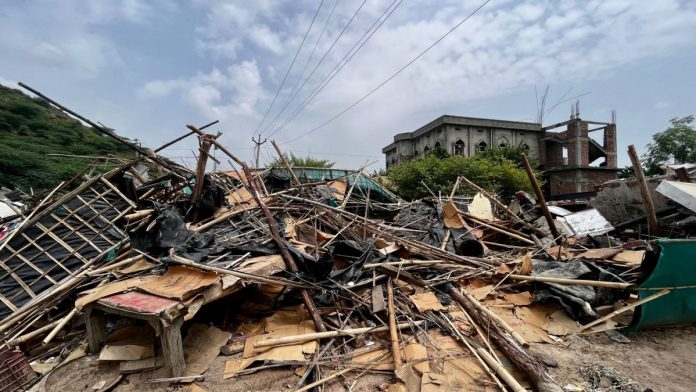Nuh: Surrounded by rubble, the Shaheed Hassan Khan Medical College stands tall on its 95-acre land in Nuh’s Nalhar. The college currently faces a row of demolished homes, shops, livelihoods and dreams.
Broken shacks, shanties and sign boards near the college are the casualty of the Haryana government’s abrupt move to demolish “illegally constructed” buildings in Muslim-dominated Nuh, which recently saw a storm of violence leaving six dead and injuring more than a hundred.
After more than 1,000 structures were bulldozed in Nuh, local Muslims feel a sense of loss that goes beyond economics. It en-compasses the powerlessness that they see as now intrinsic to their lives as Muslims in India.
Living life in harmony
Dharamveer Singh, 36, lives in the neighbouring lane from where homes and shops owned by Muslims were razed to the ground. Singh’s lane, where only Hindus live, remains untouched by the demolitions.
“We have lived among Muslims in harmony all our lives, we have never faced any verbal insult, let alone harassment and vio-lence. I feel bad that their homes are broken, that they’re scared,” says Singh, a millets farmer. Twelve other Hindu families live in the same lane as him.
Singh says that there is such amity and brotherhood between Hindus and Muslims in Nuh that beyond a point, religion stops in-terfering in their daily lives. Whether it’s business or banter about development, Singh explains that Nuh has never been a fertile ground for anti-Muslim hate. Though Nuh is Muslim-dominated, Hindus in the district said that the community has never asserted its dominance over the local minorities, which also includes the Sikh community.
The half-done Azimiya Masjid, which sits just opposite the college, is surrounded by hills of debris. Maulana Khalid, the imam of the mosque, is worried about the electricity pole which was mistakenly damaged during the demolition drive.
While the mosque was spared, all surrounding shacks and shanties near it were toppled. “This is an area where we have always respected each other’s religions. When the [Shobha] Yatra reached the mosque, we saw Hindus chanting ‘Jai Shree Ram’ and wav-ing swords and sticks. We offered them water respectfully, as they were doing their religious duty,” Khalid recalls.
Khalid also says that many non-Muslim patients from the hospital would come this masjid to bathe and get water when there was a shortage at the hospital. “There is nothing called Hindu-Muslim problems here, we have lived in peace and still want to,” he says.
The loss
Aas Mohammed, a security guard at the nearby medical college, recently lost a part of his home to the Haryana government’s demolition drive that closely followed the communal violence.
Mohammed, 57, whose son ran a tea shack near the college, also saw his own shop being flattened by the government’s bull-dozers. “They didn’t even give us a minute to vacate or at least grab our belongings. They just tore it all down,” he said. Many homes and shops, like that of Mohammed’s, could not be saved.
Mohammed also says that his own amity with Hindus has always remained pristine. “We have seen tough times, when Muslim lives were vulnerable. I was here in 1992, when the Babri Masjid was torn down, and I am here today. We supported Hindus back then, made them feel safe,” he explains.
But today, as bulldozers in India are being deployed to flatten Muslim homes out of vengeance, Mohammed feels that the demo-litions that happened in Nuh were in response to the violence that took place.
“How did my house become illegal overnight? I have an electricity meter installed for years at this address. Did the government install the meter at an illegal home?” he asks.
After seeing his 27-year-old home being reduced to debris, Mohammed is hurt but not hopeless. “This has damaged many Mus-lim homes and lives, but we will stand again, In Sha Allah,” Mohammed says.
Outsiders’ yatra?
Chandra Devi, 60, a local of Nuh, has been living in the area for decades now and has never seen anything even close to the fear she saw in the eyes of her Muslim neighbours, escaping violence they were uninvolved in.
“During the Bajrang Dal yatra, we could see how outsiders were instigating Muslims. These were not the Hindus we have here in Nuh. This is not Hinduism, Bajrang Dal has wronged even Hindus by using the religious procession to create chaos,” says Devi.
During its field visit to the affected areas in Nuh, The Wire was informed by the locals that the Yatra had taken place thrice be-fore July 2023 – but it had never before met the same fate. Just as the previous years, this year too, local Hindus and Muslims of-fered cold water to the yatris, as they also remember offering to the kanwariyas. But Singh, Devi, Mohammed and Khalid believe that something triggered a change this year.
Hifz Ur Rehman, another local, traces the trigger to a video uploaded by Monu Manesar, who is known for his anti-Muslim so-cial media content. In the video, Manesar had urged his followers to join the rally in Haryana’s Mewat. Manesar has not been ar-rested, but locals say young men from the area are being randomly picked up by the local police. As of August 8, Haryana’s infor-mation and public relations department said that 170 men were arrested in connection to 57 first information reports registered in Nuh. Locals have claimed that most of the boys being picked up by the police are Muslims; the police, however, have not released any names.
Mohammed Sajid, a biryani seller near the chowk where the violence unfolded, is also unsettled by the entire episode. While he believes that Manesar’s video and outsiders fanned the fire, he also believes that Nuh is resilient and such incidents cannot break decades of friendship between Hindus and Muslims. –Agencies




